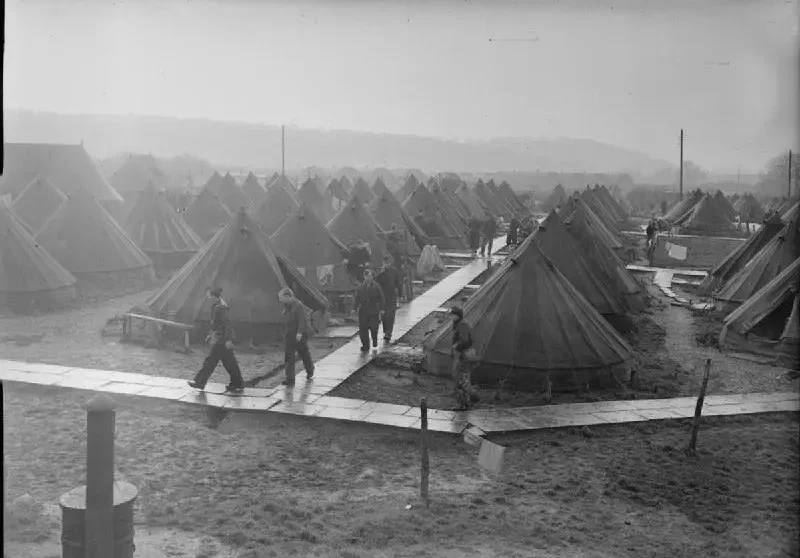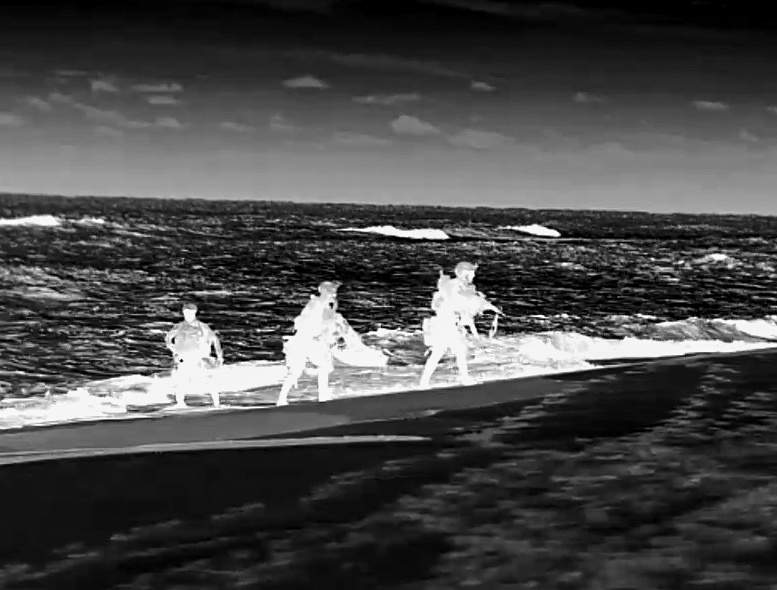Letters to Loretta: Better weather doesn’t bring better days at the Nazi POW camp
- By Kaitlin Oster
Share This Article

April 13, 1944
Kriegsgefangenenlager
Dear Doll;
Softball season started this week and we’re going at it strong, too strong I should say, for we break a bat a game. At this rate, I’ll be playing volleyball next week. Sports keep me busy during the day and my nights are always reserved for thoughts of you. I love you doll.
Love
Harold
The men organized their teams and really did enjoy the sunlight they were receiving – when it pleased the guards. His fellow prisoners weren’t the bat-breaking group of men Harold portrayed to Loretta, but he was at the very least grateful for not feeling holed up in the barracks with the bugs and the cold any longer.
Spring was proving itself more forgiving already, and with the weather only getting warmer, Harold felt optimistic. The chatter around the camps was that Hitler was losing control of his men and the war; Harold liked the idea of getting home before Christmas.
The break in the cold was pleasant enough to encourage Harold to socialize outdoors, walk around the camp, and read a little more. But as the weather got warmer, he realized that the smells of the latrine and the smells of the ill and dying worsened. If the temperature exceeded 70 degrees Fahrenheit – and God forbid if the heat was accompanied by a breeze – the smell of several thousand men’s communal toilets wafted across the camps, hanging in the air and sticking to their nostrils. There were certain parts of the camp where the men were able to socialize without having to endure the smells too much, but eventually, it became a part of their daily life, and they learned to ignore it.
Related: The FG-42 – The odd Nazi rifle created after a paratrooper disaster

Harold was certain the stench was worse than the year before when he was captured. There were promises and grievances to clean the latrines out every week. Eventually, once a week turned into once every two weeks. Once every two weeks turned into once whenever they felt like it. There was no toilet tissue available, and the men grew accustomed to saving food wrappers and sometimes old letters to wipe themselves. The Red Cross made notes of this, he was certain, but he couldn’t understand how such inaction continued.
Poor latrine conditions were the least of their concern. The camp was in violation of so many Geneva Convention laws, including the killing and beating of unarmed prisoners. Harold couldn’t understand how nothing was done. He also couldn’t let on to Loretta, though, whom he wrote home with nothing but positive notes to keep her from worrying too much.
One night, Harold lay awake and unable to shake the very real fear that he might not get out of his hell before Christmas. He was feeling awfully low, even though he was receiving packages from loved ones and letters from family. The brutality of the prison camp, of the guards, and the damned barking dogs, brought him down. It was nearly impossible to avoid the negativity when kept in a pen like an animal all day, every day. He tried his best to embrace the changing seasons, the boys outside playing softball, and the sunshine. But with the impending warm weather, Harold could only think about Loretta and Artie, the lake houses, and his first date with his gal back in 1937, or was it 1938? Strawberry ice cream, two scoops. Soon it would be their first wedding anniversary, and where was he? Stuck in prison.
Related: Letters to Loretta: The last of the Mohicans

The days and months melted together like their summer desserts and Harold found himself having difficulty recalling certain dates and memories. Soon it would be a year since his B-17 was shot down. He traced the marks on his arm from where his own plane betrayed him. And if he thought long enough about it, Harold swore he could feel the rigid scar tissue in his back pulse – a constant reminder of the day he could have died. He didn’t fault himself for wondering if death would have been the better option, as he lay there hungry and restless. His faith, though, and his love of Loretta made him trust that no, death wasn’t better.
Warm weather in prison camp didn’t mean memories and ice cream. It didn’t mean that the men would get a different meal than hot water, canned meat, or prunes. It just meant they didn’t have to burn as much of their resources to keep warm.
Sometimes, he feared, if he was quiet enough he could still hear the bed bugs crawling along the wooden bunks. The infestations only increased since his admission to Stalag XVII-B the year before, and it was apparent in the men. He thought to himself that, when he got home, he would have to convince Loretta to have all metal furniture in their bedroom when they were settled in the cottage. How badly he wanted to be next to her in bed than beside another soldier.
Read more from Sandboxx News
- Another one bites the dust: Ukrainian long-range strikes take out another Russian warship
- These are 3 popular misconceptions about the Navy SEALs
- You’re probably thinking of missile costs all wrong
- China presents an ‘urgent challenge’ Pentagon’s new weapons of mass destruction strategy says
- SOCOM’s potential new firearm is a revolution
Related Posts
Sandboxx News Merch
-

‘Kinetic Diplomacy’ Bumper Sticker (Black)
$8.00 Add to cart -

‘Sandboxx News’ Camo Trucker Hat
$29.00 Select options This product has multiple variants. The options may be chosen on the product page -

F-35 ‘Evolution’ Framed Poster
$45.00 – $111.00 Select options This product has multiple variants. The options may be chosen on the product page
Kaitlin Oster
Related to: Military History

This is how Navy SEALs conduct “over-the-beach” operations

A Delta man’s failure to follow instructions was more than it seemed

Soldiers in Alaska landed their Black Hawk on a train in a special ops exercise

Fixing the US Navy’s shipbuilding problems starts with the workers, agency analysts say
Sandboxx News
-

‘Sandboxx News’ Trucker Cap
$27.00 Select options This product has multiple variants. The options may be chosen on the product page -

‘AirPower’ Classic Hoodie
$46.00 – $48.00 Select options This product has multiple variants. The options may be chosen on the product page -

‘AirPower’ Golf Rope Hat
$31.00 Select options This product has multiple variants. The options may be chosen on the product page -

‘Sandboxx News’ Dad Hat
$27.00 Select options This product has multiple variants. The options may be chosen on the product page
